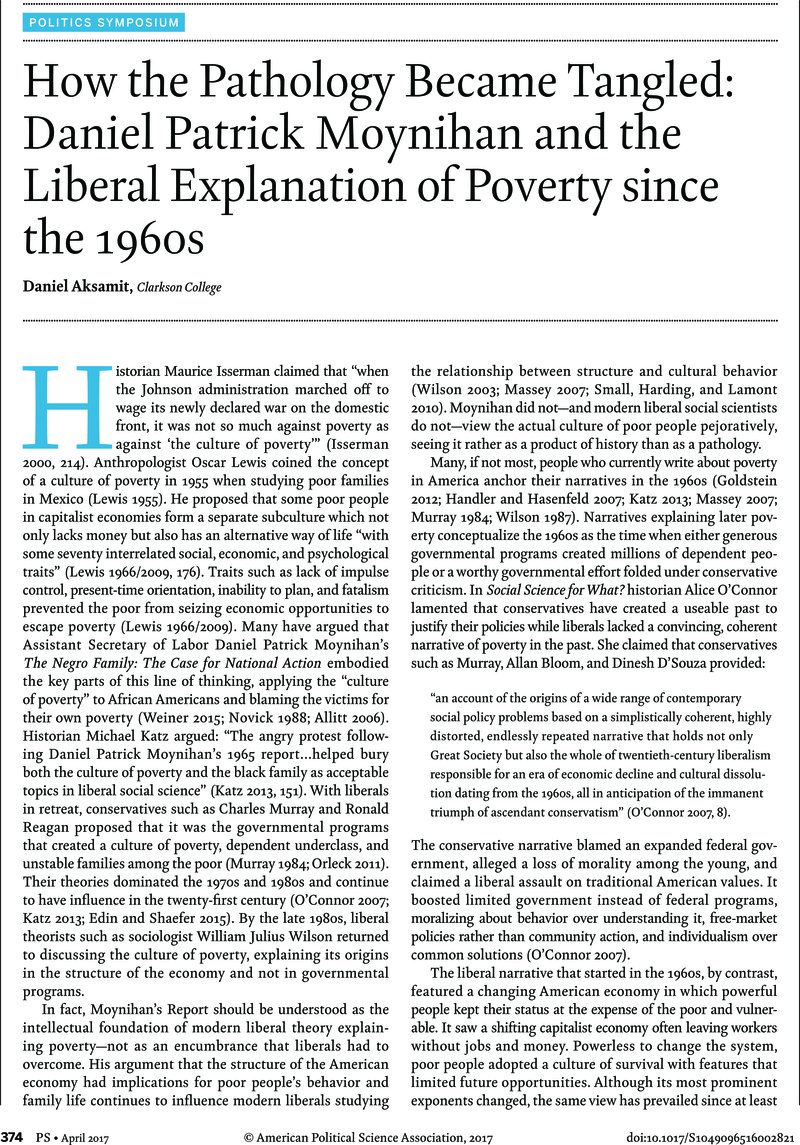No CrossRef data available.
Article contents
How the Pathology Became Tangled: Daniel Patrick Moynihan and the Liberal Explanation of Poverty since the 1960s
Published online by Cambridge University Press: 31 March 2017
Abstract
An abstract is not available for this content so a preview has been provided. Please use the Get access link above for information on how to access this content.

- Type
- Symposium: Daniel Patrick Moynihan’s America: The Legacies of a Professor–Politician
- Information
- Copyright
- Copyright © American Political Science Association 2017
References
REFERENCES
Allitt, Patrick N. 2006. “American Intellectual History and Social Thought Since 1945.” In A Companion to Post-1945 America, eds. Agnew, Jean-Christophe and Rosenzweig, Roy, 134–152. Malden, MA: Blackwell Publishing.Google Scholar
Clark, Kenneth B. 1965. Dark Ghetto: Dilemmas of Social Power. New York: Harper & Row.Google Scholar
Cloward, Richard and Ohlin, Lloyd. 1960. Delinquency and Opportunity: A Theory of Delinquent Gangs. New York: The Free Press.Google Scholar
Davies, Gareth. 1992. “Liberal Individualism and the Economic Opportunity Act of 1964.”
Journal of American Studies
26 (2): 205–231.Google Scholar
Edin, Kathryn J. and Luke Shaefer, H.. 2015. $2.00 a Day: Living on Almost Nothing in America. New York: Houghton Mifflin Harcourt Publishing Company.Google Scholar
Ehrenreich, Barbara. 2012. “Michael Harrington and the ‘Culture of Poverty.’” The Nation, April 2. https://www.thenation.com/article/michael-harrington-and-culture-poverty/.Google Scholar
Fosse, Nathan Edward. 2010. “The Repertoire of Infidelity among Low-Income Men: Doubt, Duty, and Destiny.”
The Annals of the American Academy of Political and Social Science
629 (1): 125–143.Google Scholar
Frazier, E. Franklin. 1939. The Negro Family in the United States. Chicago, IL: The University of Chicago Press.Google Scholar
Galbraith, John Kenneth. 1997. The Affluent Society, 40th Anniversary Edition. New York: Houghton Mifflin.Google Scholar
Goldstein, Alyosha. 2012. Poverty in Common: The Politics of Community Action During the American Century. Durham, NC: Duke University Press.Google Scholar
Handler, Joel F. and Hasenfeld, Yeheskel. 2007. Blame Welfare, Ignore Poverty and Inequality. Cambridge: Cambridge University Press.Google Scholar
Harrington, Michael. 1962. The Other America: Poverty in the United States. New York: The Macmillan Company.Google Scholar
Isserman, Maurice. 2000. The Other American: The Life of Michael Harrington. New York: Public Affairs.Google Scholar
Katz, Michael. 2013. The Undeserving Poor: America’s Enduring Confrontation with Poverty, 2nd ed. New York: Oxford University Press.Google Scholar
Lewis, Oscar. 1955. Five Families: Mexican Case Studies in the Culture of Poverty. New York: New American Library.Google Scholar
Lewis, Oscar. 2009. “The Culture of Poverty”. In Gmelch, George, Kemper, Robert V., and Zenner, Walter P., Urban Life: Readings in the Anthropology of the City, 5th ed
. (pp. 175–185). Long Grove, IL: Waveland Press, Inc. (Reprinted from Scientific American, 1966, New York: Harold Ober Associates, Inc.)Google Scholar
Liebow, Elliot. 1967. Tally’s Corner: A Study of Negro Streetcorner Men. New York: Little, Brown.Google Scholar
Massey, Douglas S. 2007. Categorically Unequal: The American Stratification System. New York: The Russell Sage Foundation.Google Scholar
Mattison, Edward. 1985. “Stop Making Sense: Charles Murray and the Reagan Perspective on Social Welfare Policy and the Poor.”
Yale Law & Policy Review
4 (1): 90–102.Google Scholar
Moynihan, Daniel Patrick. 1968. “Professors and the Poor.” In On Understanding Poverty: Perspectives on Poverty, ed. Moynihan, Daniel P., 3–35. New York: Basic Books.Google Scholar
Moynihan, Daniel Patrick. 1965. The Negro Family: The Case for National Action. Washington, DC: Office of Policy Planning and Research.Google Scholar
Murray, Charles. 1984. Losing Ground: American Social Policy 1950–1980. New York: Basic Books.Google Scholar
Novick, Peter. 1988. That Noble Dream: The “Objectivity Question” and the American Historical Profession (Ideas in Context). Cambridge: Cambridge University Press.Google Scholar
O’Connor, Alice. 2007. Social Science for What?: Philanthropy and the Social Question in a World Turned Rightside Up. New York: Russell Sage Foundation.Google Scholar
Orleck, Annelise. 2011. “The War on the War on Poverty and American Politics since the 1960s.” In The War on Poverty: A New Grassroots History: 1964–1980, eds. Orleck, Annelise and Hazirjian, Lisa Gayle, 437–62. Athens: The University of Georgia Press.CrossRefGoogle Scholar
Rainwater, Lee. 1970. Behind Ghetto Walls: Black Families in a Federal Slum. Chicago: Aldine Publishing Company.Google Scholar
Schulman, Bruce J. 2001. The Seventies: The Great Shift in American Culture, Society, and Politics. Cambridge, MA: Da Capo Press.Google Scholar
Small, Mario Luis, Harding, David, and Lamont, Michèle. 2010. “Introduction: Reconsidering Culture and Poverty.”
The Annals of the American Academy of Political and Social Science
629 (1): 6–27.CrossRefGoogle Scholar
Vaisey, Stephen. 2010. “What People Want: Rethinking Poverty, Culture, and Educational Attainment.”
The Annals of the American Academy of Political and Social Science
629 (1): 75–101.Google Scholar
Waller, Maureen R. 2010. “Viewing Low-Income Fathers” Ties to Families through a Cultural Lens: Insights for Research and Policy.”
The Annals of the American Academy of Political and Social Science
629 (1): 102–24.CrossRefGoogle ScholarPubMed
Weiner, Greg. 2015. American Burke: The Uncommon Liberalism of Daniel Patrick Moynihan. Lawrence: University of Kansas Press.CrossRefGoogle Scholar
Wilson, William Julius. 1987. The Truly Disadvantaged: The Inner City, the Underclass, and Public Policy. Chicago: University of Chicago Press.Google Scholar
Wilson, William Julius. 1989. “Introduction.” In Clark, Kenneth, Dark Ghetto: Dilemmas of Social Power (pp. ix-xxii). Hanover, NH: Wesleyan University Press.Google Scholar
Wilson, William Julius. 2003. “Introduction.” In Liebow, Elliot, Tally’s Corner: A Study of Negro Streetcorner Men (pp. xxxiii-xl). Lanham, MD: Rowman & Littlefield Publishers, Inc.Google Scholar
Wilson, William Julius. 2009. More Than Just Race: Being Black and Poor in the Inner City. New York: W.W. Norton.Google Scholar


